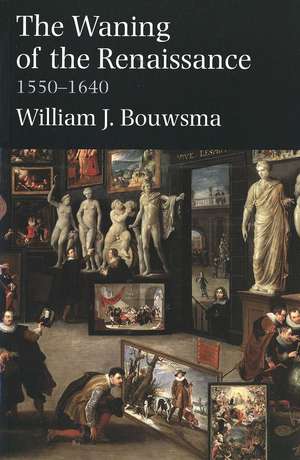The Waning of the Renaissance, 1550-1640: Yale Intellectual History of the West Series
Autor William J. Bouwsmaen Limba Engleză Paperback – 10 sep 2002
Historians have conventionally viewed intellectual and artistic achievement as a seamless progression in a single direction, with the Renaissance, as identified by Jacob Burckhardt, as the root and foundation of modern culture. But in this brilliant new analysis William Bouwsma rethinks the accepted view, arguing that while the Renaissance had a beginning and, unquestionably, a climax, it also had an ending.
Examining the careers of some of the greatest figures of the age—Montaigne, Galileo, Jonson, Descartes, Hooker, Shakespeare, and Cervantes among many others—Bouwsma perceives in their work a growing sense of doubt and anxiety about the modern world. He considers first those features of modern European culture generally associated with the traditional Renaissance, features which reached their climax in the late sixteenth and early seventeenth centuries. But even as the movements of the Renaissance gathered strength, simultaneous impulses operated in a contrary direction. Bouwsma identifies a growing concern with personal identity, shifts in the interests of major thinkers, a decline in confidence about the future, and a heightening of anxiety.
Exploring the fluctuating and sometimes contradictory atmosphere in which Renaissance artists and thinkers operated, Bouwsma shows how the very liberation from old boundaries and modes of expression that characterized the Renaissance became itself increasingly stifling and destructive. By drawing attention to the waning of the Renaissance culture of freedom and creativity, Bouwsma offers a wholly new and intriguing interpretation of the place of the European Renaissance in modern culture.
Examining the careers of some of the greatest figures of the age—Montaigne, Galileo, Jonson, Descartes, Hooker, Shakespeare, and Cervantes among many others—Bouwsma perceives in their work a growing sense of doubt and anxiety about the modern world. He considers first those features of modern European culture generally associated with the traditional Renaissance, features which reached their climax in the late sixteenth and early seventeenth centuries. But even as the movements of the Renaissance gathered strength, simultaneous impulses operated in a contrary direction. Bouwsma identifies a growing concern with personal identity, shifts in the interests of major thinkers, a decline in confidence about the future, and a heightening of anxiety.
Exploring the fluctuating and sometimes contradictory atmosphere in which Renaissance artists and thinkers operated, Bouwsma shows how the very liberation from old boundaries and modes of expression that characterized the Renaissance became itself increasingly stifling and destructive. By drawing attention to the waning of the Renaissance culture of freedom and creativity, Bouwsma offers a wholly new and intriguing interpretation of the place of the European Renaissance in modern culture.
Preț: 301.17 lei
Nou
Puncte Express: 452
Preț estimativ în valută:
57.63€ • 59.55$ • 47.94£
57.63€ • 59.55$ • 47.94£
Carte tipărită la comandă
Livrare economică 19 martie-02 aprilie
Preluare comenzi: 021 569.72.76
Specificații
ISBN-13: 9780300097177
ISBN-10: 0300097174
Pagini: 304
Ilustrații: 20 b-w illus.
Dimensiuni: 156 x 235 x 23 mm
Greutate: 0.49 kg
Ediția:Revised
Editura: Yale University Press
Colecția Yale University Press
Seria Yale Intellectual History of the West Series
ISBN-10: 0300097174
Pagini: 304
Ilustrații: 20 b-w illus.
Dimensiuni: 156 x 235 x 23 mm
Greutate: 0.49 kg
Ediția:Revised
Editura: Yale University Press
Colecția Yale University Press
Seria Yale Intellectual History of the West Series

